Nov 1, 2018 | Cultural Organizations, Kingston Chamber Music, Ruth and Hal Launders Charitable Trust
Historically, the Kingston Chamber Music Festival has served two distinct audiences: younger school children through its schools outreach program and middle age to older adults who have patronized the summer festival since its inception. This latter community is dwindling as age takes its toll. The KCMF Board recognizes an immediate need to safeguard the long-range stability of this celebrated organization by intentionally diversifying its audience base.
Thanks to generous support from the Launders Trust, the KCMF Board of Directors is able to address a key element of the current KCMF strategic plan: to attract and serve younger audience members in their thirties and forties who can help define, lead, and support the Kingston Chamber Music Festival over the coming decades.
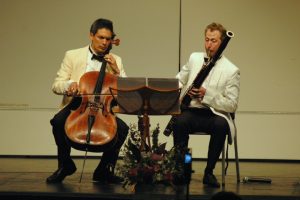
As a Board, we are pursuing the following strategies to build a younger audience base:
1. Implementation of focus groups comprised of younger local concertgoers to determine present barriers to KCMF attendance and preferences among the 30-40-somethings for programming;
2. Exploration of opportunities for collaborative programming between the local Contemporary Theatre Company, the Pumphouse Music Works, the Jamestown Arts Center, the South County Art Association, and similar organizations;
3. Booking at least one or two Launders-sponsored, KCMF events in new venues with KCMF-endorsed crossover artists and programming, if findings so indicate;
4. Improvement of the KCMF digital toolkit to enhance social media and web interface for the purpose of strengthening sales, audience outreach and follow-up; and
5. Recruitment of talented younger individuals to the KCMF Board of Directors.
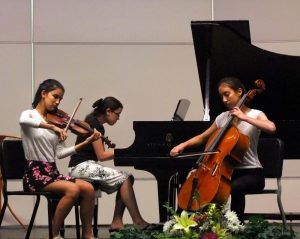 The focus of this targeted Launders funding opportunity is welcome. For the long-term health of the organization, we need to diversify our audience base. A small KCMF sub-committee, including our President and our Managing Director, who is a member of the thirty-something community is presently engaging in deep conversations with contemporary peers to ascertain barriers they perceive in KCMF concert attendance and what would have to change to attract their attendance/participation in the future. Focus group sessions around this topic will be convened in late November, either at the Contemporary Theatre or the Pumphouse Music works.
The focus of this targeted Launders funding opportunity is welcome. For the long-term health of the organization, we need to diversify our audience base. A small KCMF sub-committee, including our President and our Managing Director, who is a member of the thirty-something community is presently engaging in deep conversations with contemporary peers to ascertain barriers they perceive in KCMF concert attendance and what would have to change to attract their attendance/participation in the future. Focus group sessions around this topic will be convened in late November, either at the Contemporary Theatre or the Pumphouse Music works.
Additionally, we have booked concert space at the Pumphouse Musicworks for a crossover concert with KCMF artists in late February 2019. Natalie Zhu , Artistic
Director of the KCMF is in the process of confirming musicians for this performance, one who has an international reputation for his crossover endeavors. We anticipate that further programming for this audience will be in response to our findings from the focus groups and questionnaires.
We thank the Launders Trust Board of Directors for its investment in the Kingston Chamber Music Festival, and we look forward to keeping you all updated on our progress.
Contributed by Guest Author: Deborah Grossman-Garber. Deborah is an active member of the KCMF Board of Directors, a lifelong devotee of chamber music, and an amateur violist. She retired in 2015 from her post as the State of Rhode Island’s Associate Commissioner for Post-Secondary Education. She formerly served as director of Student Learning Outcomes Assessment at the University of Rhode Island. She earned her graduate degree in Ancient History and Mediterranean Archaeology at the University of California – Berkeley.
Aug 3, 2018 | early childhood program, preschool, Preschool of the Arts, PSA, Ruth and Hal Launders Charitable Trust
“Look! A squishy worm!” A small child lifts her mud-covered hand to show her teacher the worm she found on the preschool playground. Soon a group of children are gathered around the muddy patch, searching for more worms with spoons and shovels.
Later, after washing up and returning to their classroom, the teachers help the children document what they learned about worms: “They like wet places. Worms live under logs. They make dirt when they poop.” The teachers transcribe the words on a big piece of paper, spelling out the letters as they write. The children are eager to show their parents the document they created together.
This preschool in Madison, Wisconsin may be hundreds of miles away from the sophisticated financial markets of Wall Street, but a very important and smart investment is gaining value on that muddy playground. High quality early childhood programs, especially those serving low income families, create a rate of return at about 13% per annum, based on a study led by James Heckman, Nobel laureate and economics professor at the University of Chicago. According to Heckman, the value of preschool is delivered to society in the form of reduced health care costs, reduced crime, greater earnings, and other benefits as the children grow up and enter the workforce.
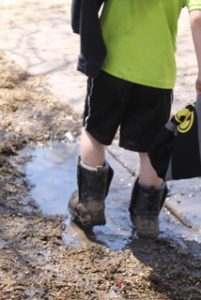 The study, called The Life-Cycle Benefits of an Influential Early Childhood Program, analyzes the effects of two large-scale preschool initiatives: The Carolina Abecedarian Project (ABC) and the Carolina Approach to Responsive Education (CARE). Both projects provided quality early childhood care and education to children from birth to age five. Though these initiatives were implemented in the 1970s, Heckman’s work shows the outcomes are relevant today and suggest that the best public policy solutions, such as the funding of early childhood programs, address a combination of issues — such as education, health, and crime – in a coordinated and blended fashion.
The study, called The Life-Cycle Benefits of an Influential Early Childhood Program, analyzes the effects of two large-scale preschool initiatives: The Carolina Abecedarian Project (ABC) and the Carolina Approach to Responsive Education (CARE). Both projects provided quality early childhood care and education to children from birth to age five. Though these initiatives were implemented in the 1970s, Heckman’s work shows the outcomes are relevant today and suggest that the best public policy solutions, such as the funding of early childhood programs, address a combination of issues — such as education, health, and crime – in a coordinated and blended fashion.
The Importance of Empathy in the Classroom
In a recent interview with National Public Radio, Heckman described the study’s findings and spoke about the key elements of quality early childhood education. Hiring good teachers is a significant challenge, but defining good teaching can be even harder. Heckman comments, “There have been a lot of studies, serious studies, that show that many of these so-called guides to what makes a good teacher — in terms of things like number of degrees or number of teacher credits and on and on and on — are really worthless in terms of predicting who’s a good teacher. What is important is finding this empathy, this ability to work with people, the engagement.” Heckman goes on the describe empathy as the ability to engage with a child in a conversation that challenges children to ask questions and think deeply. 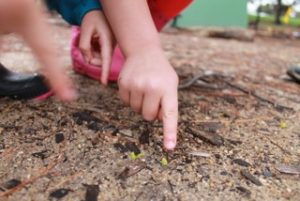
Finding an early childhood program where teachers engage with children in meaningful conversations can be difficult, especially in low-income communities. One model that emphasizes this type of child-centered curriculum is the Reggio Emilia approach, named for the Italian city where the model was developed more than 50 years ago. Schools that practice a Reggio Emilia approach do not use a pre-written curriculum – the activities and lessons are developed through a collaboration between children, teachers, and families. If the children demonstrate an interest in a topic, such as worms, the teachers facilitate the development of a learning project that may last for weeks or even months. In the example of the worm study, children learn vocabulary and literacy skills as they ask questions about worms and write down their ideas and observations. They also learn early math skills when they measure and count the worms, in addition to the many science concepts covered during their outdoor explorations.
An Arts Integration Approach
The muddy playground described earlier is part of a unique early childhood program called Preschool of the Arts (PSA) in Madison, Wisconsin. PSA serves 200 children, starting as young as 18 months old. The importance of empathic, responsive teaching, as described by Professor Heckman, is emphasized through the integration of the arts in the PSA curriculum, including visual arts (painting, drawing, sculpture, etc.), music, and dance. Following a Reggio Emilia-inspired curriculum, teachers facilitate long-term investigations based on children’s interests. Project topics have included far ranging subjects such as birds, tents, planets, bones, and goats. Recruiting and retaining exceptional teachers who are able to lead this type of responsive, child-centered curriculum requires a level of funding that is not typical of early childhood programs in the United States. The primary source of income at PSA is parent tuition, which is relatively high for this Midwest community. As an independent nonprofit organization, PSA must seek resources beyond parent tuition in order to serve an economically diverse population of children and families and, thus, create the lasting economic benefits described in Heckman’s research. The support of the Ruth & Hal Launders Charitable Trust helps Preschool of the Arts expand its reach by providing funds for both tuition assistance as well as outreach programming. 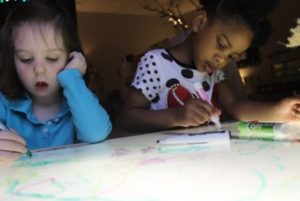
At Preschool of the Arts, developing community partnerships is another important strategy for implementing quality early childhood programming that provides benefits beyond the walls the of school. In the summer of 2018, PSA launched a new outreach program that involves a series of child-centered art classes for low-income Head Start students in Dane County, Wisconsin. The classes are taught by PSA staff members who are trained and skilled in both arts integration and trauma-informed care. A grant from the Ruth & Hal Launders Charitable Trust supports the development of the pilot curriculum, the staffing and implementation of the classes, as well as the art materials and children’s books that the Head Start teachers will use to extend the benefits of the art classes into other elements of the children’s program.
Frederick Douglass once noted, “It is easier to build strong children than to repair broken men.” The benefits of these initiatives that expand access to quality early education will extend well beyond the time these children spend in a preschool classroom. As decades of research into early childhood education has proven, we will all profit from these early investments.
Contributed By Guest Author: Ann Gadzikowski. Ann is an author and educator with a passion for challenging children to think creatively and critically. A graduate of the Erikson Institute, Ann has more than twenty-five years of experience as a teacher and director of early childhood programs. She is the author of curriculum books, teaching guides, classroom readers, and numerous publications for parents of young children. Ann serves as executive director of Preschool of the Arts, a Reggio-Emilia inspired school in Madison, Wisconsin. Ann is a frequent speaker at professional conferences, such as the National Association for Young Children.
Jun 25, 2018 | NPR, public radio, Ruth and Hal Launders Charitable Trust
The Ruth and Hal Launders Charitable Trust has truly helped meet the needs of radio listeners in Central Virginia through its support of the Community Idea Stations. The Ruth and Hal Launders Charitable Trust has provided funds for operating support of the stations and has helped to encourage the partnership of other listeners in the community by supporting on-air challenges broadcast during membership drives.
Public Radio Stations differ all over the country, but they have one thing in common: they require public support to thrive. Being community-supported, they reflect the diverse, particular nature of their localities. Community Idea Stations in Richmond, Virginia, offers both news/talk programming (88.9 WCVE) and music programming (93.1 and 107.3 WCVE) as it serves Central Virginia.
Public Radio Meets Needs of Listeners
Public radio stations exist to serve the members they support, not to meet the demands of advertisers. National Public Radio (NPR) Member Stations, share a mission to inform the public, increase understanding of the world and enrich the experience of everyday life. Each Member Station determines its own format and schedule. Stations create their schedules based on the interests and needs of their local audience. Some stations focus on news and information while others follow a music format – with programming ranging from classical, to jazz, or world music.
In Richmond, for example, WCVE members’ dues and community support like that of the Ruth and Hal Launders Charitable Trust, paid at the local level, support local news created by its own news team, and also support national and international NPR news and analysis. This non-commercial partnership encourages creation of content that responds to listeners’ needs and interests, rather than content driven by advertising. This format allows examination of critical issues in depth and encourages honest discourse from all points of view.
NPR Member Stations and Community Partnership Results in High-Quality Content
Many public radio stations across the country are NPR members. NPR Member Stations are independent, locally owned and operated broadcasters. About two-thirds of these stations are licensed to, or are affiliated with, colleges or universities. The remaining third are governed by community-based boards. The Community Idea Stations offers news/talk programming on its 88.9 channel as an NPR Member Station and through subscription to other content providers.
NPR, headquartered in Washington, D.C., offers content to which these local Member Stations subscribe. National dues for joining are paid by the local station and generated through member and community support.
Member Stations are partners with NPR in newsgathering. Member Station reporters provide hundreds of news pieces every year, putting NPR News on the scene wherever news happens. Station reporting makes up a key part of NPR’s national newsmagazines and newscasts, and is especially critical for the
coverage of milestone news events such natural disasters, the impact of war on local communities, and national elections. These reports bring local flavor, relevance and perspective to NPR programs, with local reporters and hosts who are deeply familiar with the issues, events and people they cover.
In a time of media fragmentation and sound bites, NPR and Member Stations have succeeded in focusing on in-depth, high-quality news. NPR has evolved from a secondary to an essential news source, with dozens of bureaus around the world and the nation. Drawing on more than 340 news staff (reporters, correspondents, newscasters, editors, producers hosts and bloggers) in the United States and abroad — from Washington, D.C., and New York City, to Beijing and Dakar, NPR has the capacity to stay on top of breaking news, follow the most critical stories of the day and track complex issues over the long term. Since 1971, NPR and its journalists and programs have won hundreds of awards including some of the most prestigious honors in journalism.
Public Radio Offers a Front Row Seat to the Arts
Public Radio stations often offer broadcast content that would not be commercially viable, but that still holds great importance for our culture and society at large. They are uniquely able to do this because of member and community support.
In Richmond, Virginia, for example, the Community Idea Stations’ WCVE Public Radio delivers Richmond’s only radio home for daily classical and jazz music on channels 107.3 and 93.1, perhaps offering a young child his or her first experience of these musical forms. The station offers a unique platform for the local symphony and classical groups or local jazz musicians to share their work with the community at large. In addition to offering locally produced music programs, the stations also offer outstanding subscribed national programs like Sunday Baroque, Performance Today, With Heart and Voice and much more. For the audience, the station offers a front-row seat to expand their awareness and enjoyment of these music forms.
Ruth and Hal Launders Charitable Trust gifts have helped local arts organizations like the Richmond Symphony, the Virginia Opera, and others extend their reach beyond live audiences. Its support has helped expand audiences for major local music festivals like the Richmond Folk Festival and The Richmond Jazz Festival, through the Community Idea Stations’ live broadcasts.
Delivery of this deeply sourced and high-quality news content, as well of delivery of outstanding locally produced and nationally subscribed music programs, is made possible by individuals and community organization partners all over the country. For Central Virginia, the Ruth and Hal Launders Charitable Trust, has been a significant partner in making sure that public radio is alive and well, delivering the best in news and music for area listeners.
Contributed By Guest Author: Trish Poupore, augmented with content from NPR.org. Trish Poupore has been director of major gifts at the Community Idea Stations for seven years.
Mar 9, 2018 | Ruth and Hal Launders Charitable Trust, Solar Electric Light Fund
In the United States, women are finally being encouraged to speak out and bear witness to their experiences of sexual harassment and assault. Many with access to a media platform have seized the opportunity to tell their stories. But what about those in remote, cut-off parts of the developing world who suffer in silence?
There are millions of women and girls without the means to report that they have been assaulted and raped, especially in arid, Sub-Saharan countries where they often need to walk, unprotected, for miles every day to fetch water in remote areas. Fearing retribution for speaking out against their attackers, most remain silent. In addition to suffering physical, mental, and emotional damage, many end up pregnant and infected with sexually transmitted diseases. For most of the young girls, their lives have been irrevocably changed, offering little hope for their future.
One of the most practical ways to reduce the vulnerability of such women and girls is to eliminate the need for them to leave their villages to search for water. With support from the Ruth and Hal Launders Charitable Trust over several years, the Solar Electric Light Fund (SELF) was able to provide water for drinking as well as irrigation through its Whole Village Solar Electrification project in the communities of Bessassi and Dunkassa in Benin in West Africa. This project changed forever the lives of the women and girls there. No longer do they have to fear the threat of brutal attacks when collecting water. So successful was the Launders-supported project in Benin that SELF is about to launch a similar one in Uganda.
Of course, solar-powered pumps alone cannot prevent every sexual assault. Our intent is that the technology will be coupled with education, public outreach, and strictly enforced laws to protect the women from inappropriate and often brutal assaults.
Whether in a remote village in Uganda or in a modern urban setting in the industrialized world, women deserve to live with dignity and the confidence that they are safe from predation. While the revolution has begun in the U.S., let us not forget the women in Sub-Saharan Africa—and elsewhere in the developing world—who can start to affect change with something as basic as a solar-powered water pump.
Contributed by Guest Author: Robert Freling. Robert
is Executive Director of the Solar Electric Light Fund (SELF), a Washington, DC-based nonprofit organization that has been on the cutting edge of delivering solar solutions to rural villages since 1990. Under his leadership, SELF has pioneered the use of solar power for a wide range of applications including household lighting, water pumping, school electrification, drip irrigation and wireless Internet access. SELF has completed projects in 20 countries, making it a leader among non-governmental organizations in providing practical and cost-effective renewable energy alternatives for the developing world.
Fluent in Spanish, French, Portuguese, Russian, Chinese and Indonesian, Mr. Freling holds a B.A. in Russian Studies from Yale University, and an M.A. in Communications Management from the Annenberg School of Communications at the University of Southern California. Mr. Freling is the recipient of the 2008 King Hussein Leadership Prize.
Feb 1, 2018 | Conservation Law Foundation, Rhode Island Legal Food Hub, Ruth and Hal Launders Charitable Trust
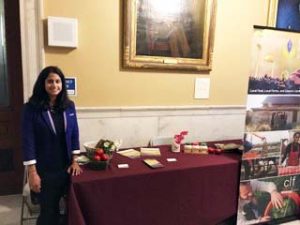
Sumana Chintapalli, Farm & Food Legal Fellow, tabling for the Hub at the Rhode Island state house.
Food is one of the few things that unites us all – no matter where we live, what we do, whom we know, at least one thing is true and the same for everyone: we all have to eat.
While food plays a vital role in our lives and cultures, we often don’t think about how it arrives on our plates. Too many of us are disconnected from the people who grow, package, and sell our food, and they are often forgotten when we talk about needs and gaps in our food system. Our farmers and small food enterprises are integral to our economy, yet these businesses subsist on increasingly narrow margins. One way to help support this important part of our food system is to help these businesses access legal help that can allow them to build, grow, and continue to play a critical role in supporting a sustainable, resilient food system.
By connecting these small farmers and food entrepreneurs with free legal services, Conservation Law Foundation’s (CLF) Rhode Island Legal Food Hub helps keep our farmers and food businesses afloat.
The Rhode Island Legal Food Hub has made great progress since its launch in November 2016. We now have 27 law firms in our Rhode Island network and 20 cases have been placed. The Hub also allows us to identify and address issues facing farmers and food entrepreneurs so we can cater our work to their needs through resources such as workshops and webinars. As we get a deeper sense of the legal needs facing the farm and food space here in Rhode Island, we are also looking to change state and local policy as necessary to better support the state’s robust local food economy.
We are fortunate in Rhode Island to have a strong network of collaborators all working toward the common goal of strengthening our local and regional food systems. To advance this goal, we frequently partner with kitchen and small business incubator programs, other nonprofits including local land trusts, and Rhode Island government entities. On matters from food waste to farmland access, CLF has had the opportunity to work with partners on solutions to problems that affect not only the food system, but also the environment and public health – areas that all interconnect to impact our collective quality of life.
CLF is incredibly grateful for the support from The Ruth and Hal Launders Charitable Trust. It is gratifying to see the results of serving real people in real time. The Hub has helped a farmer avoid getting dragged into costly litigation between two other parties, assisted new farmers with the formation of their business, and assisted with the formation of farm and food nonprofits. The Hub has connected new food entrepreneurs with invaluable trademark advice and provided farmers with important liability guidance. And the Hub has engaged a valuable network of dedicated volunteer attorneys who are devoting time, energy, and excitement toward this work.
Healthy communities and healthy economies go hand-in-hand, and without a healthy food system, neither is possible. We look forward to continuing to work together with our food system partners toward an affordable, just, sustainable, resilient, and healthy Rhode Island, and New England, food system.

Contributed by Guest Author: Amy Moses. Amy is Vice President and Director of CLF Rhode Island. Before joining CLF, she was Deputy Counsel to Rhode Island Governor Gina Raimondo. She has served as a law clerk in Rhode Island’s state and federal courts and spent several years as a litigation associate at Skadden Arps Slate Meagher & Flom LLP. Before attending law school, she was a program development coordinator for the R.I. Chapter of the American Civil Liberties Union and a conservation organizer for the R.I. Chapter of the Sierra Club. Amy earned a B.S. in Environmental Economics and Policy from the University of California, Berkeley and a J.D. from The George Washington University School of Law. She is admitted to practice in Rhode Island, Massachusetts, the U.S. District Court for the District of Rhode Island, the U.S. District Court for the District of Massachusetts, the U.S. Court of Appeals for the First Circuit, and the U.S. Supreme Court. Amy was recognized as the 2017 Newsmaker by R.I. Lawyers Weekly, the R.I. Women’s Bar Association, and the R.I. Chapter of the Federal Bar Association.

 The focus of this targeted Launders funding opportunity is welcome. For the long-term health of the organization, we need to diversify our audience base. A small KCMF sub-committee, including our President and our Managing Director, who is a member of the thirty-something community is presently engaging in deep conversations with contemporary peers to ascertain barriers they perceive in KCMF concert attendance and what would have to change to attract their attendance/participation in the future. Focus group sessions around this topic will be convened in late November, either at the Contemporary Theatre or the Pumphouse Music works.
The focus of this targeted Launders funding opportunity is welcome. For the long-term health of the organization, we need to diversify our audience base. A small KCMF sub-committee, including our President and our Managing Director, who is a member of the thirty-something community is presently engaging in deep conversations with contemporary peers to ascertain barriers they perceive in KCMF concert attendance and what would have to change to attract their attendance/participation in the future. Focus group sessions around this topic will be convened in late November, either at the Contemporary Theatre or the Pumphouse Music works.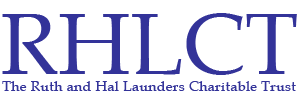


 The study, called
The study, called 






Recent Comments